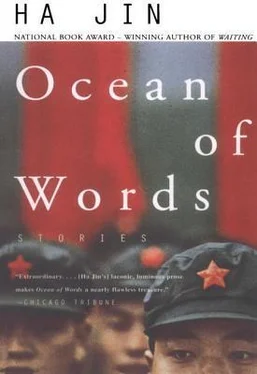TO MY TEACHER
LESLIE EPSTEIN
Our Most Respected Divisional Commissar Lin:
I am writing to report on an event that occurred last Saturday afternoon. Our Reconnaissance Company, the best trained men and the flower of our Second Division, marched through Longmen City to the Western Airport, where we were to do parachute exercises. While we were passing Central Boulevard at the corner of the First Department Store, I ordered Scribe Hsu Fang to start a song with an eye to impressing the pedestrians. He executed the orders, and the whole company began to sing:
Good-bye, mother, good-bye, mother —
The battle bugle blowing,
Steel guns shiny,
The outfits on our backs,
Our army is ready to go.
Please do not weep in secret,
Please do not worry about your son.
Wait for my triumphant return;
I will see you then, my dear mother.
……
While we were singing, the march suddenly slowed down, and the uniform footsteps of one hundred men grew disordered. The words and music, suitable only for lamentation, melted the strength in the soldiers’ feet. I shouted to stop the singing, which in fact became crying. But we were in the middle of the thoroughfare, and my voice could not overcome the loud noises of the bustling traffic, so they continued to sing. Some new soldiers burst out sobbing; even the experienced ones were overwhelmed with tears. Imagine, a hundred of the best-disciplined fighters were bleating without shame on the street like a herd of sheep! And with machine guns and bazookas! People paused on the sidewalks to watch us whining and weeping. Someone commented, “This is a funeral procession.”
I do not blame my men, nor have I criticized Scribe Hsu Fang. They are brave soldiers, and the history of our company has borne that out with ample evidence. Our Most Esteemed Commissar Lin, probably I am partly responsible for this occurrence, because I did not prevent my men from learning the song in the first place. My vigilance of class struggle must have slackened. I thought it would do them no harm if they sang a song that the Central Radio Station broadcast every day. Please do not misunderstand me here: We did not teach this contagious song; the soldiers just learned it by themselves. My mistake was not to intervene in time.
The event I have described demonstrates that this song is a counterrevolutionary one. All the men in my company now feel ashamed, because they were seized by the surprise of bourgeois sentiment. We have all been dishonored and have done damage to the image of our army.
It goes without saying that a true revolutionary song belongs to the kind that inspires, unifies, and instructs, not like the one we sang, which undermines our morale and destroys our solidarity. A good song must encourage people’s upright spirit and must make friends more lovable and enemies more detestable. Commissar Lin, you must remember those old genuine revolutionary fighting songs; here I cannot help picking out one as an example:
We are all super marksmen.
Every bullet strikes an enemy dead.
We are all swift troops,
Not afraid of waters deep and mountains high.
On the lofty cliffs
There are our quarters.
In the thick woods
There are many good brothers.
If we have no clothes and food
The enemy sends them to us.
If we have no weapons
The enemy makes them for us.
We were born and grew up here,
Every inch of the land is ours.
If someone dares to take it from us,
We shall fight him to the end!
What a song! At this very moment of writing, I can recall that when singing it we walked with tremendous confidence, as if the earth beneath our feet would quake because of us and as if we could topple the mountains and overturn the seas, not to mention eliminate our enemies. I need not dwell on this further, because you, a Revolutionary of the Older Generation, actually grew up with those genuine songs, and you must have a profounder understanding of their nature than I do.
The lesson we have learned from the reported event is as follows: Our class enemies are still active, and they never go to sleep; whenever we doze off, they will take advantage of us, sabotaging Socialism and changing the political color of our army. We must grow another pair of eyes in the backs of our heads so that we can keep them under watch everywhere and at all times.
Our Most Respected Comrade Commissar, on behalf of my company, I suggest we ban this poisonous song and investigate the family and political backgrounds of its author and its composer. Whoever they are, they undoubtedly have the outlook of the bourgeoisie. They have committed sabotage — their work aims to disable our troops, corroding the iron bastion from within. Also, those who have helped disseminate this song must not be let off their responsibility. Ideally, we should bring a couple of people to the Military Court. We must show our enemies that we are also superior fighters on the Ideological Front!
My Revolutionary Salute,
I Remain Your Loyal Soldier,
Political Instructor and
Party Secretary of
Reconnaissance Company —
Chen Jun
Longmen, May 27
It began as a bet at the Spring Festival. After the feast, the soldiers of my company were playing chess and poker, chatting and cracking roasted peanuts and sunflower seeds. In the Second Platoon some men were talking about women and bragging of their own ability to resist female charms. Gradually their topic shifted to the Shanghai girls at the Youth Home in Garlic Village. How were the girls doing on the holiday eve? What a pity there was no man in their house. Who would dare to go have a look and ask if they miss their parents and siblings?
Someone said he would pay a Spring Festival call on the girls after eleven. Another boasted that he would take a bottle of wine to that house and have a cup with them. Emboldened by alcohol and the festive atmosphere, they indulged themselves in the big talk.
Then Kong Kai declared he dared to go and sleep on the same brick bed with the girls. This was too much. Everybody thought he just wagged his tongue, and they told him to draw a line somewhere if he wanted to talk sense. But a few men challenged him and even proposed a five- yuan bet. To their amazement, Kong swung his quilt roll on his back and set off for the Youth Home.
There was only one young man living at that house, but he had left to spend the holiday with his family in Shanghai. Unlike the country women, those city girls had tender limbs and looked rather elegant. They knew how to use makeup and wore colorful clothes.
Kong entered the Youth Home and dropped his quilt at the end of the brick bed. The five girls were too shocked to stop him. He climbed on the bed, spread his quilt, lay down, and closed his eyes. For half an hour, they didn’t know what to do about this man, who wouldn’t respond to their questioning and tittering and instead was sleeping or pretending to be asleep. They brought out candies, chocolates, and frozen pears in the hope of inducing him to open his mouth, which like his eyes was shut all the time. They even cooked him a large bowl of dragon-whiskers noodles with garlic, ginger, and two poached eggs, hoping the fragrance might arouse his appetite. Nothing worked. One of them put a few lamp-soot stains on his face, saying, “This makes him look more handsome.” They giggled; still he remained motionless. Finally, the five girls decided to keep watch on him by turns throughout the night, for fear he might do something unusual once they went to sleep, though they knew Kong by sight and didn’t feel he was a bad man. Each of them sat beside him for one and a half hours while the rest were sleeping at the other end of the large bed. The oil lamp was burning until dawn.
Читать дальше











